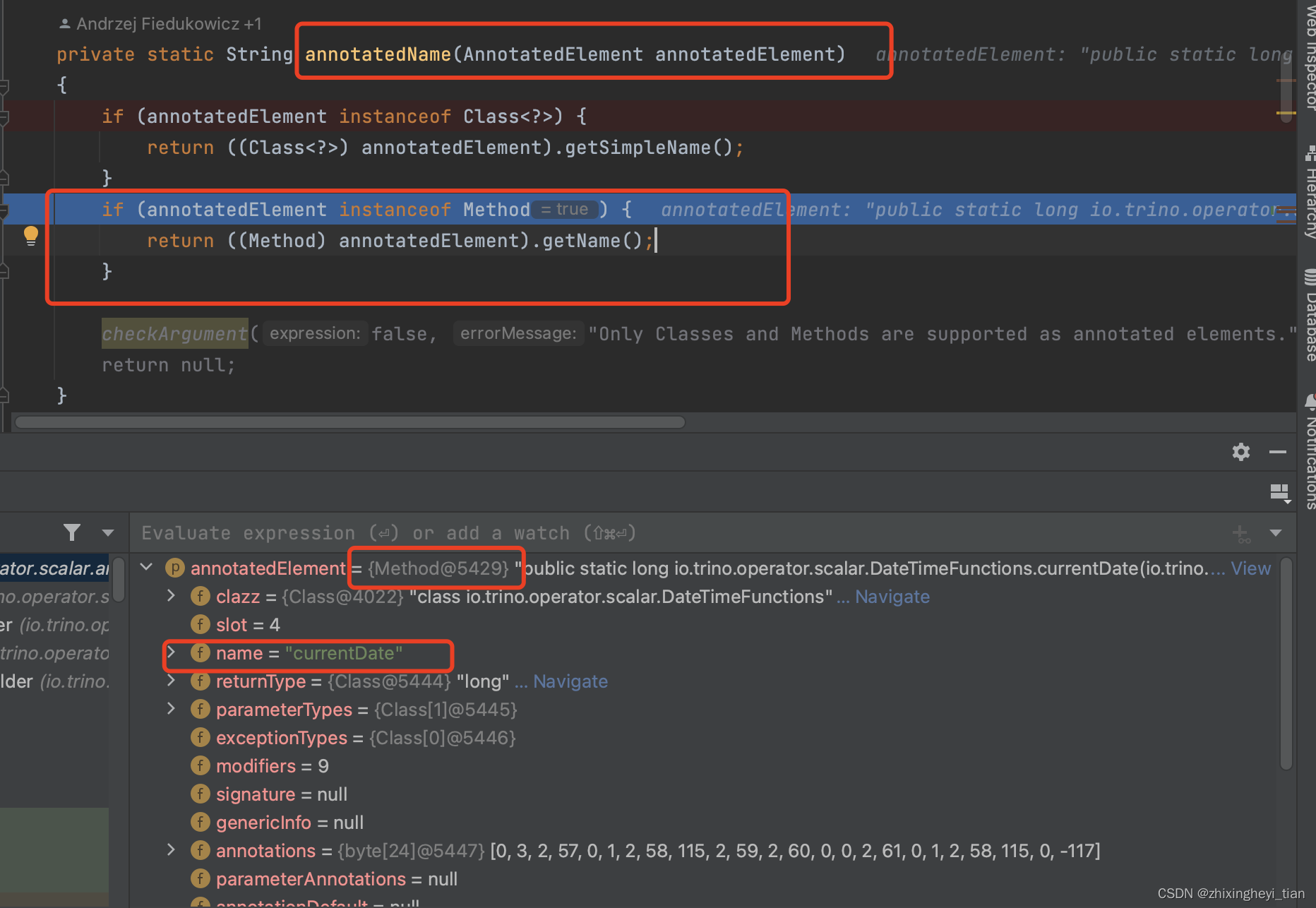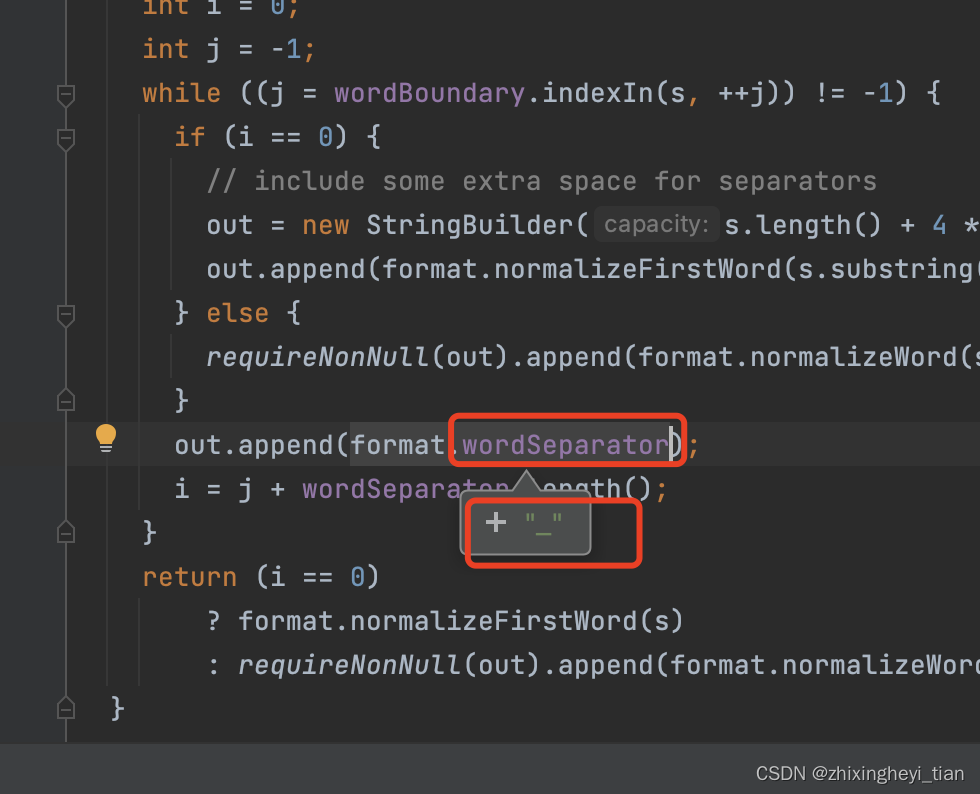本文主要是介绍Trino 源码剖析,希望对大家解决编程问题提供一定的参考价值,需要的开发者们随着小编来一起学习吧!
Functions
function 反射和注册
io.trino.operator.scalar.annotations.ScalarFromAnnotationsParser
这里是提取注解元素的方法
String baseName = scalarFunction.value().isEmpty() ? camelToSnake(annotatedName(annotated)) : scalarFunction.value();
这里如果 scalarFunction 的注解没有没有值,直接对函数名进行snake命名法
一般程序设计中,有两种变量命名规范:Snake方式和Camel方式。
- Snake方式是指单词用小写字母,单词间下划线(“_”)代替空格;
- Camel方式是指相邻单词首字母用大写表示,对单词加以区分。
例如,你想定义一个变量表示一个数组数字之和,并且用英文“sum of array”。我们使用Snake方式的变量名为:sum_of_array;用Camel命名方式的变量名为:sumOfArray。
public static List<ScalarImplementationHeader> fromAnnotatedElement(AnnotatedElement annotated){ScalarFunction scalarFunction = annotated.getAnnotation(ScalarFunction.class);ScalarOperator scalarOperator = annotated.getAnnotation(ScalarOperator.class);Optional<String> description = parseDescription(annotated);ImmutableList.Builder<ScalarImplementationHeader> builder = ImmutableList.builder();if (scalarFunction != null) {String baseName = scalarFunction.value().isEmpty() ? camelToSnake(annotatedName(annotated)) : scalarFunction.value();builder.add(new ScalarImplementationHeader(baseName, new ScalarHeader(description, scalarFunction.hidden(), scalarFunction.deterministic())));for (String alias : scalarFunction.alias()) {builder.add(new ScalarImplementationHeader(alias, new ScalarHeader(description, scalarFunction.hidden(), scalarFunction.deterministic())));}}if (scalarOperator != null) {builder.add(new ScalarImplementationHeader(scalarOperator.value(), new ScalarHeader(description, true, true)));}List<ScalarImplementationHeader> result = builder.build();checkArgument(!result.isEmpty());return result;}
io.trino.operator.scalar.annotations.ScalarImplementationHeader

private static String annotatedName(AnnotatedElement annotatedElement){if (annotatedElement instanceof Class<?>) {return ((Class<?>) annotatedElement).getSimpleName();}if (annotatedElement instanceof Method) {return ((Method) annotatedElement).getName();}checkArgument(false, "Only Classes and Methods are supported as annotated elements.");return null;}
由上可得 method 也是一种 AnnotatedElement
trino 中的 snake 命名法
io.trino.operator.scalar.annotations.ScalarImplementationHeader
private static String camelToSnake(String name){return LOWER_CAMEL.to(LOWER_UNDERSCORE, name);}
com.google.common.base.CaseFormat
/*** Converts the specified {@code String str} from this format to the specified {@code format}. A* "best effort" approach is taken; if {@code str} does not conform to the assumed format, then* the behavior of this method is undefined but we make a reasonable effort at converting anyway.*/public final String to(CaseFormat format, String str) {checkNotNull(format);checkNotNull(str);return (format == this) ? str : convert(format, str);}
/** Enum values can override for performance reasons. */String convert(CaseFormat format, String s) {// deal with camel conversionStringBuilder out = null;int i = 0;int j = -1;while ((j = wordBoundary.indexIn(s, ++j)) != -1) {if (i == 0) {// include some extra space for separatorsout = new StringBuilder(s.length() + 4 * format.wordSeparator.length());out.append(format.normalizeFirstWord(s.substring(i, j)));} else {requireNonNull(out).append(format.normalizeWord(s.substring(i, j)));}out.append(format.wordSeparator);i = j + wordSeparator.length();}return (i == 0)? format.normalizeFirstWord(s): requireNonNull(out).append(format.normalizeWord(s.substring(i))).toString();}

这篇关于Trino 源码剖析的文章就介绍到这儿,希望我们推荐的文章对编程师们有所帮助!







